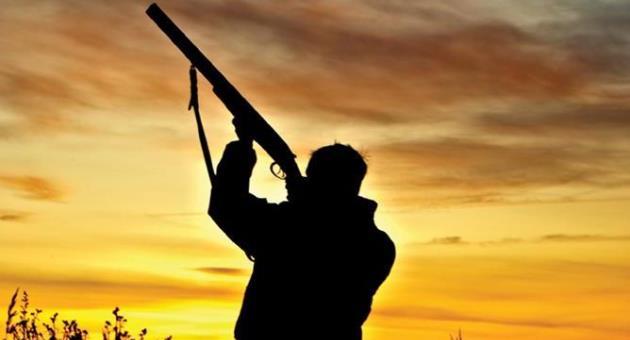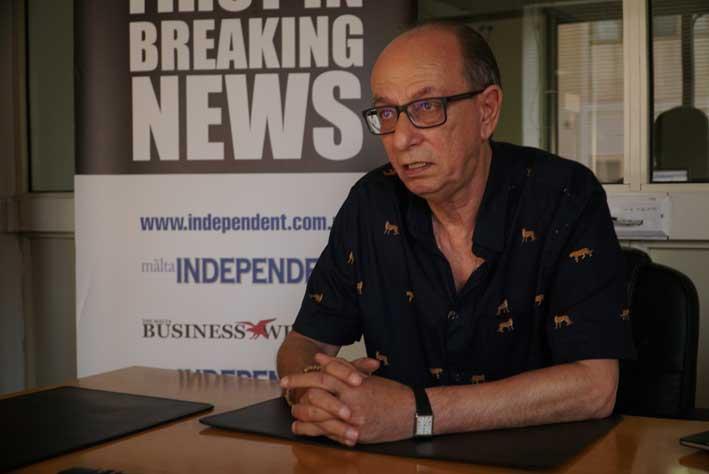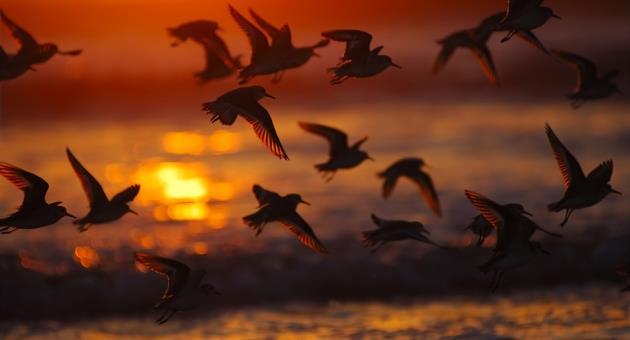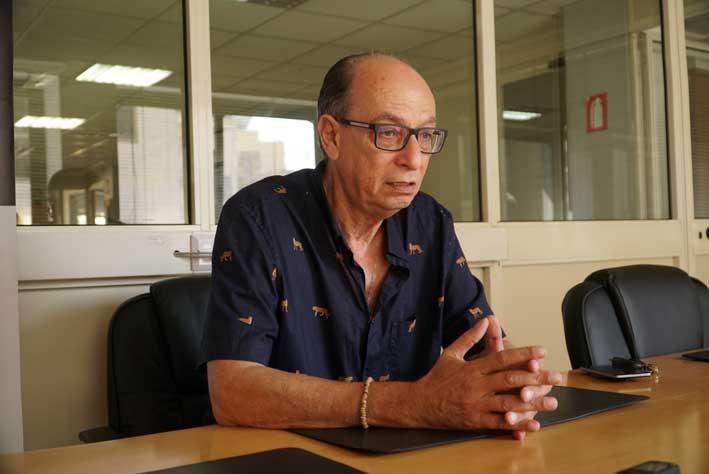I suppose there is nowhere else to start but the recent shooting of protected storks around the island, not to mention the fact that a number of offences have already been recorded at the start of the hunting season. Is there a growing issue with illegal hunting?
The number of illegalities has fallen dramatically; we are now talking about tens instead of the thousands that Birdlife said were taking place. Personally, I don't think it is either possible or realistic to reduce the number of illegalities to zero, any more than it is with any other crime. Unfortunately, human nature is what it is.
Statistics show that while the numbers did fall, especially after the referendum, the last three hunting seasons have seen a steady increase.
Yes, you're right, but it's still in that region - having gone up to something between 20 to 40 incidents. I have to say that credit has to go to the Administrative Law Enforcement (ALE) and the inspectors of the WBRU, who are also assisted by FKNK and Birdlife.
With regard to the killing or shooting of storks, one person is already being arraigned in court, and it is not even clear whether he shot two, three or four. The case, as usual, has been blown out of proportion by foreign media, who claim that a whole flock of 18 storks had been massacred when there is no evidence to indicate this.
The person who allegedly shot the storks is just one out of 10,000 adult FKNK members, and his membership has been suspended pending the outcome of the case. Just because one person out of 10,000 has committed an offence does not mean we have lost control of our members, which is what Birdlife has claimed

So, with regard to cases such as these, do you believe that a person should be suspended from the FKNK for life if he or she is found guilty?
It depends on the charge and the gravity of the offence. It may be that we won't even have to do it ourselves if the court revokes the person's hunting licence, because that will automatically revoke their membership. If, let's say, the court suspends the person for two years, then it is up to us to decide what further action should be taken.
Would it not be more beneficial to the hunting community at large if the FKNK took a tougher and harsher stance when it came to illegalities?
Some years ago we tried to take a stand and 'name and shame' certain individuals, but we were called in by the Data Protection Commissioner as a result. Another time I said that there were people the police knew about but they never took action, and I was called in for questioning on three separate occasions because they wanted to know who they were. You need to be careful when it comes to some things.
You mentioned that the killing of the storks was blown out of proportion by the media, but when a flock of storks migrates over the island and a number of them are shot, it's not surprising that people are shocked. Do you not think that FKNK should be doing more to police its own members?
No, we already have our marshals during the open season. Obviously, we cannot let their identities be known in a country where everyone knows everyone else and, in any event, we cannot have our members policing these areas throughout the year.
I would also like to clarify that 23 per cent of individual checks recorded by the European Courts of Justice is one of the highest in Europe, and the ECJ knows this.

Yet, when illegalities take place, we usually hear strong condemnation from only Birdlife or similar groups. Wouldn't stronger messages from the FKNK help?
We have tried to be proactive and act cordially with Birdlife. There was a time when an enforcement unit, known as the Environment Monitoring Board, consisted of representatives from Birdlife, the FKNK, the police, and the army, and it yielded significant results - particularly with the offences that occurred in Buskett, which is no longer a black spot.
Why did this cooperation stop?
I had personally made an agreement with the then-director of Birdlife, Paul Portelli, that we would not verbally attack one another in public. Of course, we would each defend our own interests, but we would not attack each other. Then one fine day, the president at the time came out attacking us, and this relationship eventually broke up.
The issue is very delicate and unless Birdlife at least accepts traditional spring hunting - which is already very limited, and the controlled capture of live finches, then we can never start working together.
In October 2003, after we had already decided to join the EU, Birdlife called a press conference where they said that they had accepted limited spring hunting and that they hoped that the government would not go beyond what had been agreed. Unfortunately, the second we joined everything changed and the attacks started. First the court case, then the referendum, and now the moratorium.

On the subject of spring hunting, Birdlife recently made a call for a second referendum on spring hunting, while FKNK has pushed for a change to referendum law; can you explain?
The way a referendum can be called in Malta is not fair. You can collect signatures for a 20-year period until you reach the 30,000 mark. There has to be a limit. We are not saying that there should be a law blocking a referendum but it must be altered to become fair and just.
As far as spring hunting is concerned, the bird conservation lobby thought they had an open and shut case when they took us to court, and while Malta technically lost, the main principle - that a country could apply for a derogation as long as a suitable alternative was available - was established.
There are a lot of restrictions now. The season has been reduced from 60 whole days to just seven (14 half-days), the number of species that can be shot has been reduced from 32 to two and there are bag limits.
There has to be a period where a socio-cultural tradition that has been practiced forever can still be practiced. We won the right in court and we won the right in a national referendum, even though people used to say that 90 per cent of the population was against spring hunting and even though we were up against 14 NGOs, a political party in AD, and the three independent newspapers.
Since the referendum, the International Union for Nature Conservation (IUNC), which consists of Birdlife biologists and activists, decided to push for a moratorium on the turtle dove. While we still maintain that this should not apply to Malta, we agreed only because this is a temporary - and not a total - ban.
We are doing everything we can to negate what we take from the wild. For example, we have raised 30 turtle doves in captivity and released them back into the wild. We believe we are almost at the stage where we can go to the government with material and scientific facts to apply for the derogation once again.
Given that you already have five months of hunting in the autumn season, does it make any logical sense for the future of hunting to continue killing birds during their breeding season and just wipe out the population altogether?
It depends what you mean by that.
The number of turtle dove, for example, has fallen significantly across the globe - and particularly in Europe. What is the point of hunting them if it is detrimental to the long-term conservation of hunting?
It has fallen on a global basis and we are working to find out why this is happening. The birds that fly over Malta come from particular breeding sites in eight different countries, if I'm not mistaken. If, year after year, the number of breeding pairs falls, then there is a problem, but if that number is stable or increases, then we are fine. As a simplistic example of the study we are conducting, let's say we shoot 100 turtle doves in Malta and it is established that, year after year, there are 250 breeding pairs, then those 100 are not affected.

When will this be published?
We are waiting for several results from the countries involved. Unfortunately, we are the ones who are open to help, but some countries do not provide certain details.
So, if the research shows that the number of breeding pairs is falling, would you consider backing a temporary ban on spring hunting?
No, but only because we are sure that the populations have gone down for several reasons, as outlined in an ICUN report. Of the many reasons they provided - such as loss of habitat and loss of food - hunting is at the very end. I hope to prove that even when we took 40,000 there was no effect on the number of breeding pairs, of which there are millions.
We'll await the results then. Spring hunting, however, is not the only issue facing hunters, with the European Courts of Justice declaring that finch trapping in Malta is illegal. Is it time to admit defeat on this issue?
I don't believe so. Actually, we have just received some very encouraging news from our lawyers in Brussels, who have analysed the court case and have seen what should be done. This year, as we have always done - even when it was not permitted - we applied to the Ornis Committee for a derogation for trapping. However, in the light of the court case, the Maltese government may not be prepared to grant this.
We are still willing to work with the government in future seasons, so even if it does not open this year, we are confident that it will in the future. If I had given up on the issue when I started out 35 years ago, then I would not be here today. We continue to get many young people who are interested in joining us, so there will be others to take on the mantle.

Earlier you said that it was the bird conservation lobbies that had the support of the media houses, NGOs and a political party. However, as shown from the way you are talking, the FKNK does have quite a significant backing from the two major political parties, both of whom backed you in the referendum, not to mention that the current Parliamentary Secretary for Animal Rights, Clint Camilleri, is an FKNK member. Do you agree that the FKNK has too much influence over government?
There are also about six other MPs who are our members, but I don't think we have much power. Actually, I believe the opposite. It is simply unfair what Birdlife and other partners receive from the government, compared to us. Birdlife has Simar, Għadira, Foresta 2000, and now they have Salina, along with the €150,000 a year spending money that comes with it.
When Birdlife was given Salina, Environment Minister José Herrera promised to give FKNK some land to manage. However, this piece of land was the size of a football pitch and happened to be occupied by other people already. Needless to say, eventually we got nothing.
What's even worse is that when it was agreed to extend the hunting hours at Majjistral Park by an hour or two, the government compensated the Gaia Foundation with the sum of €300,000 for simply allowing what already had been agreed.
This is ample proof of what NGOs protection means. It means that money is enough to shut their mouths on these issues.
Apart from this, Birdlife's general secretary is Saviour Balzan, the managing director of Malta Today, which helps with what kind of reports it publishes on the issue.